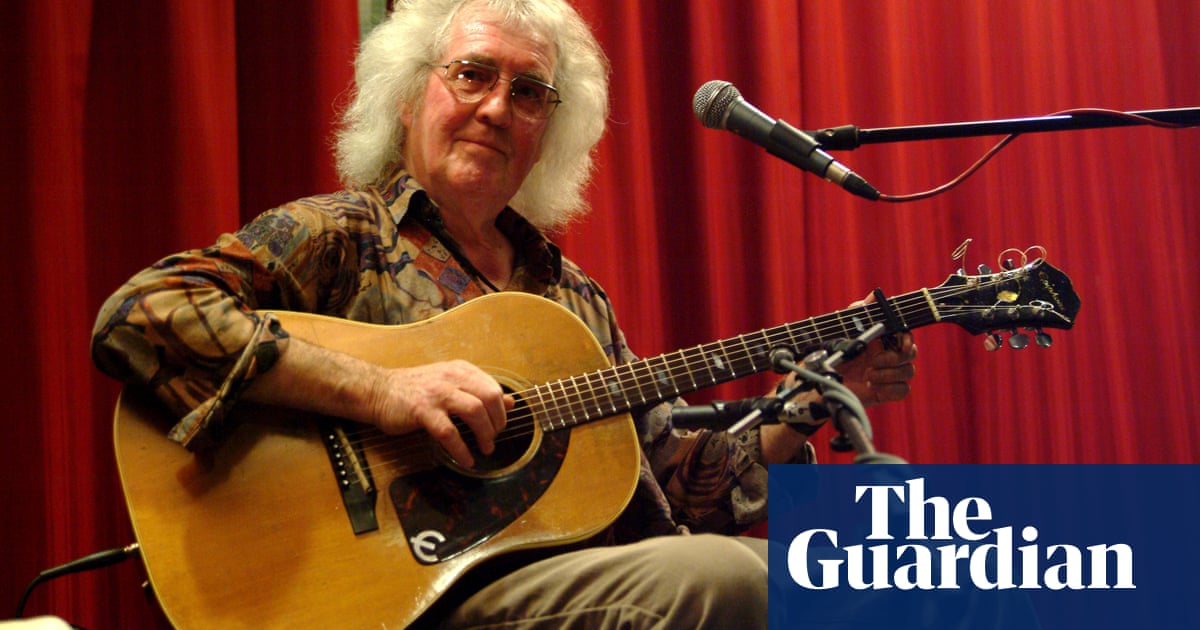When Bruce Springsteen played the Berlin Olympiastadion in May 2012,he beganwith a powerful song about an East Berliner celebrating freedom. Few, if any, in the crowd would have realised thatthe original versionof When I Leave Berlin was written in 1971 by an English guitarist and singer-songwriter, whom Springsteen failed to mention.
Wizz Jones, who has died aged 86, never did enjoy the success of many of his contemporaries, but was a folk scene hero with a dedicated following, particularly among other musicians. In his 2010 autobiography, Life, Keith Richards describes meeting Wizz while he was at art college, before joining the Rolling Stones: “Wizz Jones used to drop in, with a Jesus haircut and a beard. Great folk picker, great guitar picker … I think I learned Cocaine from him – the song and that crucial fingerpicking lick of the period, not the dope …”
He also impressed another guitar hero, the folk singer Martin Carthy, who first met Jones in the late 1950s. “He was extraordinary,” Carthy said. “People always talk aboutDavy Graham, but Wizz was his equal. He could play a blues that swung like mad, and also wrote some very beautiful songs. I played with him a couple of times and he was always different. He was a one-off, a beatnik – he had really long hair even then.”
Wizz learned by listening to American heroes such as Blind Lemon Jefferson, Big Bill Broonzy andDerroll Adams, as well as Graham andLong John Baldryin the UK, and was the archetypal troubadour; he played in the London coffee houses and folk clubs, then took off to France, Morocco or his beloved Cornwall. When the journalistAlan Whicker visited Newquayin 1960 for a BBC report on the campaign to ban beatniks from the Cornish town’s pubs and shops, Jones played a starring role, demonstrating his fine finger-picking guitar work as he sang “It’s hard times in Newquay if you’ve got long hair.”
One of those who played with Wizz in Cornwall was the singer-songwriter Ralph McTell – in the days before he became famous forStreets of London. He said: “It was like getting a knighthood – I couldn’t believe one of my heroes was inviting me down to Cornwall. He had a tent with his wife and boys, I had a little tent, and we played at a pub called the Mermaid in Newquay – until we got fired because the place couldn’t cope with the number of people who came.” He went to a launderette with Wizz “and he realised he hadn’t got any money on him. So we went outside with our guitars and busked for 20 minutes until he had the money to do the nappies.”
Another regular visitor to Cornwall was the banjo player Pete Stanley, with whom Wizz worked for four years and recorded his first album, Sixteen Tons of Bluegrass (1966). He also played withClive Palmer, after he left the Incredible String Band. “Two undisciplined wandering beatnik minstrels – they hit it off,” McTell said.
His debut solo album, Wizz Jones (1969), was recorded for a major label, United Artists, and includedDazzling Stranger, one of many songs that he covered that were written by his friend Alan Tunbridge. In the 70s he recorded for other labels including CBS, Village Thing (the folk indie started by the musician and writer Ian A Anderson) and for labels in Germany. He collaborated with now-famous friends, including McTell,John RenbournandBert Jansch, and started a band, Lazy Farmer, that included his wife, Sandy. And he began recording his own powerful songs, including When I Leave Berlin and his exquisite, highly personal song to Sandy,Happiness Was Free(1976).
In the 80s, a difficult time for many folk artists, he survived by driving a truck delivering furniture, while also playing as a duo, the Cynic Brothers, with his saxophone and harmonica-playing son, Simeon. In the 90s he released his first album in the US, Dazzling Stranger (1995) and toured there for the first time. A major tourwith Sonic Youthin 2001 was cancelled because of 9/11; his plane was forced to turn back.
In later years, his career took an upturn. In 2013 he made a magnificent contribution to the Janschmemorial concertat the Royal Festival Hall, London, and toured and recorded with Renbourn. Their albumJoint Control(2016) was released after Renbourn’s death. With his old friend McTell, he recorded About Time (2016) and About Time Too (2017).
Come What May (2017) was recorded with yet another guitarist friend, Pete Berryman, and Simeon, with Simeon’s son Alfie joining on one track. The three Jones generations also gave shows together. In 2019 Wizz was presented with a lifetime achievement award at the BBC Folk awards.
Wizz was born in Croydon, south London, and brought up by his mother, Alice – his given name was Raymond, but his love of magic tricks earned him the nickname Wizzy the Wuzz. His father, Timothy, returned from the second world war in 1945 after being held as a PoW by the Japanese, listed as missing, and found it impossible to settle into any one job. His story is told in Wizz’s pained songBurma Star. Wizz attendedOval primaryand junior schools and Selhurst grammar, and left school at 16 “with meagre qualifications”. He played in a skiffle group, then started travelling.
In 1963 he married Sandy Wedlake, who says they met “when I was 15, coming up to 16, and he was an old man of 20 or 21”. She survives him, along with their children, Marty, Daniel, Simeon and Bonnie, and four grandchildren.
Wizz (Raymond Ronald) Jones, guitarist, singer and songwriter, born 25 April 1939; died 27 April 2025
